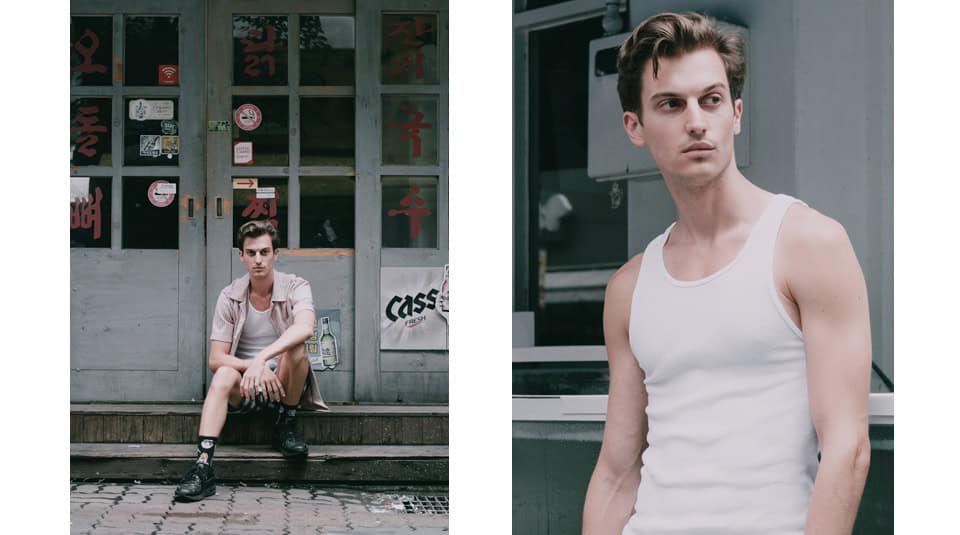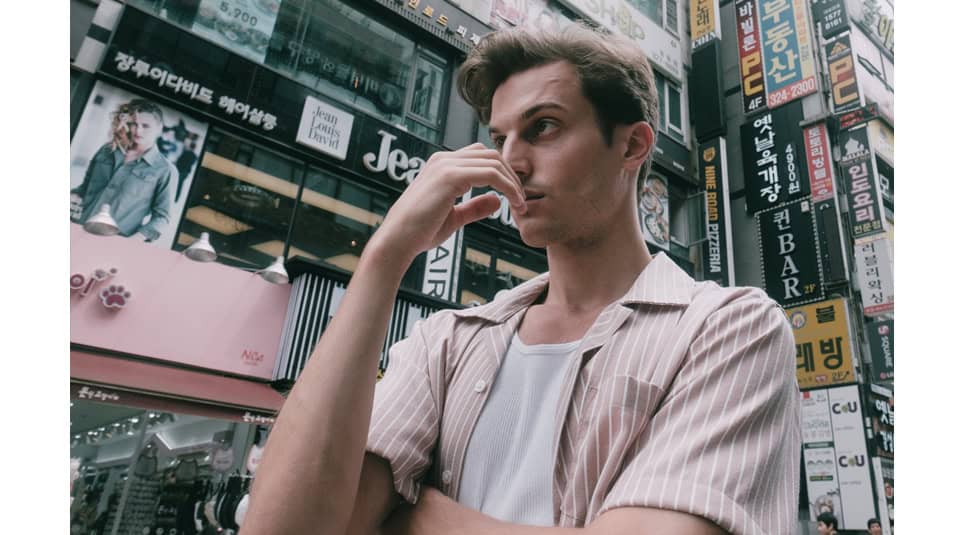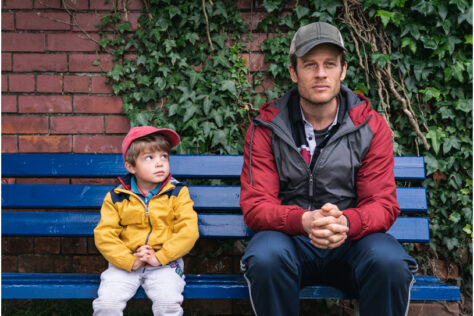The fact that anybody would come watch a movie called Anuses kind of blows my mind. I was surprised.
One thing we can say about Peter Vack’s Assholes with any kind of confidence is that it lives up to its name 100%. This is the kind of all-in, zero-fucks commitment of celluloid dreams worthy of admiration. And to describe Vack’s debut feature is something we’re gleefully prepared to do.
Assholes opens with desperately horny addict Adah (Betsey Brown) unloading a five-minute diatribe onto her therapist about her out-of-control libido. In a chance encounter, she takes a liking to fellow addict Aaron (Jack Dunphy). Here’s the thing about Aaron: He can’t resist assholes, in the anatomical sense, and Adah definitely has one. Naturally, the two bond over fringe desires, relapse on poppers purchased at a corner bodega, and embark on a whirlwind trip through New York City. It’s a batshit journey riddled with herpes sores, ass-play, and a rectal demon named Mephistopheles conjured from excessive butt activity—taking the form of a middle aged woman played by Eileen Dietz, the actress behind Pazuzu’s face in The Exorcist—who, in Vack’s peak brainchild, moves in with them and helps Adah plot her brother Adam’s (Vack) murder. Not only are Adah and Aaron the biggest assholes New York has ever seen—a tall order to fill!!—we spend a chunk of the film watching their faces literally turning into the movie’s title via prosthetics.
In this edition of This Course at the Bucheon International Fantastic Film Festival, Vack takes us into the world of Assholes. The goal of this series of food and talk is to keep things transparent. It’s essentially an open dialogue, in this instance over lunch at Green Leaves in Bucheon, South Korea.
Bucheon International Fantastic Film Festival runs July 13 – 23.
I can’t say that inviting you to lunch to talk about Assholes, and assholes, was the best idea.
Oh I know, right?
What sort of questions got asked at the Q&A last night? Are Korean audiences different?
People were asking questions that were similar to the ones American audiences ask. People were curious about what it was like working with my family. People always want to know what my parents and my sister thought when they first read the script. The hardest question I always get is probably, “How did the idea come to be?” When you look at almost any piece of creative work, I think there’s this assumption when you’re on the receiving end of it that the idea arrived fully formed and there was this grand plan from the beginning. At least in my experience making things, that’s usually not the case. Especially with Assholes, when I was writing the script, it just started as one scene, then another scene…There was never any idea that the movie would be what it ultimately wound up being. I think audiences really want to know, “But how did you come up with this?” thinking there was one influence or one impulse that can be traced to a single origin.
I think self-hatred is basically the closest I can get to what it was that inspired this because that’s really true. I was really mad at myself, as I often am. I was writing, really, as an exercise. I wasn’t writing thinking it would become anything more than that. Over the years, the script sort of evolved into what it was. Obviously, when you’re making the movie the script changes, too.
What did you think about the audience’s reaction during the actual screening?
I don’t think Korean audiences are vocal in the way American audiences are, so if there was any little response, I took that to be a huge response. And we got them. There were little murmurs, titters and laughs, and I was really excited. I could also sense from the questions they were asking that Korean audiences are very tuned in. You can correct me if I’m wrong about this, but it doesn’t feel like big responses are that common with Korean audiences.
I think it’s definitely suppressed. Another thing I’ve noticed with Korean audiences—I go to the movies quite often here—is that there are no walkouts. I honestly thought at least one person would take offense and walk out of Assholes, but nope.
American audiences would walk out. People have walked out of this movie. Another thing that I learned after the screening from one of the head programmers that was really interesting is that there is no double entendre in the Korean language for “asshole.” In America, we take it for granted that “asshole” is a body part, but more often used as an expletive like “shithead.” The programmer told me that it’s now more commonly used in Korea because the younger culture is absorbing it from American shows but, basically, this movie is called Anuses here. The fact that anybody would come watch a movie called Anuses kind of blows my mind. I was surprised. I mean, there were some little old women in the audience last night.
Yeah, I was sitting next to one. I didn’t hear a peep out of her.
Also, poppers? The audience really had no idea what that was. But it’s very heartening to think that specific, cultural markers that are important in your mind for a movie can translate to an audience that doesn’t relate to those cultural markers. You still get that visceral reaction. I love that.
Have you tried watching movies on Korean TV channels in your hotel room? They blur out bullet and knife penetrations. They even blur out cigarettes if there’s lip contact.
Really? How does a festival like this even exist? If they’re blurring out cigarettes, how are they showing Assholes? Can you tell me anything about that?
Well, Assholes is clearly advertised as rated X. They can check your ID. It’s not something kids can find at home by flipping through channels.
It makes the choice to show this movie even more profound that, on TV, you can’t even see it.
Funnily enough, pot is probably the most innocent thing you have going on in the movie for American audiences, but it’s 100% illegal here. That’s viewed as a hard drug in these parts.
Yeah, I was asking one of the festival volunteers about it to get a handle on what it’s like here. The vibe is that you can find it, but the consequences are severe. You can smoke weed on the street in New York and a cop will probably come up to you, take a hit, and leave you alone. It’s just become such a part of the culture. I was definitely curious about the weed situation here.
What’s your logline for Assholes when people ask? Maybe you don’t want to offend them.
I have a hard time with it because, maybe to my detriment, I like keeping things secretive. I also think the ideal way to see this film—or any movie for that matter—is to know nothing. I usually tell people that it’s about two sober drug addicts who meet, relapse, and fall in love. That’s usually all I tell them. After seeing the movie, maybe that sounds like a flippant or a cheeky way to describe it, but I actually do see the movie primarily as a love story.
I know they’re acting and I don’t know them personally, but your parents give off such a cool vibe in the film. They seem like really nice people.
That’s so sweet.
When you’re parents first read the script for Assholes—
They were repulsed. I love them and we really are so close. We’re so lucky and blessed to have a really great relationship. But, you know, there’s a double edge to everything. It’s almost naive of me because I really do share my work with them and want their opinions on things. I finished the script for Assholes and thought, “I want to send this to my parents and see what they think.” When you’re a writer and you’re living with something day in and day out, you lose sight of how it’s going to affect someone on their first reading. I remember being at my friends play and saying to my sister Betsey [Brown]—I think she had read the script at that point—”Mom and dad have said nothing about the script of Assholes.” She replied, “Peter, why did you send that to them? Don’t send that!” Betsey is a little better at knowing what’s appropriate. In a way, I think I sometimes don’t know. On the page, I think my parents just found it even more disturbing. I had to explain to them what I was going for, how I was going for something that mixes genres, and that it’s ultimately a comedy. I think they thought certain things would be depicted that I didn’t ultimately depict, which would’ve been even more salacious. Once the movie was a reality, they were totally excited to act in it. They love acting. I mean, it goes without saying that they’re just so supportive.
How did Betsey react initially?
One thing worth mentioning is that I didn’t write this part for Betsey. I kind of feel like I have to say it because, if I did write this role with my sister in mind, I think I should be in a mental hospital or in jail—or something. It’s the sickest, most perverse thing for a brother to do. It would be incest! It would be wrong of me to come up with these scenarios and think, “Oh! I know who’s going to play this part! Myyyyy sis.” In the first draft, it was a feud between exes/lovers, not between siblings. Part of the development of the script was doing these readings with me, my best friend Aaron Mark—the character of Aaron is based on him—and Betsey. Betsey just happened to be the closest actor we had on hand for the part, so she read the role almost out of convenience. But Aaron was always the one who said, “You should just find a way for Betsey to play this.” I’m like, “She can’t play it! They’re exes! That’s disgusting!” But then over the course of those developmental readings, I realized that the script was actually more interesting if it was siblings. Growing up, Betsey and I didn’t have a great relationship. It’s not that we fought, but I sort of ignored her. Like in the script, she wanted my attention and I didn’t give it to her, so that’s from real life. What’s interesting about that is, in doing that, this movie exists where a brother “wrote” a part for his sister that no brother should ever write for his sister. That’s like a happy accident.
On top of that—I genuinely believe this—there’s no other actor in the world who could’ve played the part the way Betsey did. There’s an elasticity to what she does where, in one moment, she’s totally grounded and believable, and the next moment, she’s like a cartoon character. It’s like Kabuki Theater. It goes so large and then so small. I wasn’t even expecting that when we started production. We found a lot of that on set and in the moment. Watching the movie, I just don’t know if there’s another actress who would’ve done this or could’ve done it. Betsey has this ability to let go of any and all modesty. There are scenes in there where, if there was any modesty on the part of the actor, you would see it and it would not work. If there were scenes where you think, “Those actors don’t really want to be doing this,” the movie would be weird and you wouldn’t like it. Betsey’s involvement was a dream come true. It’s lucky that we can collaborate as siblings.
To keep things spoiler-free, let’s call it the film’s Times Square chunk. Was that scary to film?
It was like we were all living in another world. That was the very last thing we shot. I don’t think we would’ve been able to do that if it weren’t the last thing we shot. Everyone was under the spell of the movie by then. Not just the actors but the crew, too. We were all sort of insane at that point.
You and Betsey played siblings before Assholes in a movie called Consent, which your dad wrote and directed. Do you think your parents really opened your arms up to the arts?
I don’t think it’s possible to know what I would’ve done with other parents. But definitely, with these parents. My father was an actor when he was a young man. I can say this now because they’re both not with us anymore: My father’s parents weren’t really supportive of his decision to become an actor. My father did move to New York City and acted in Broadway musicals, but his parents’ voices were really loud in his brain, like, “You should get a real job.” He did go into business. Then after about 20 years in the restaurant business, he took 10 years off to make independent films. This was when I was a teenager, so seeing him do that, it really showed me firsthand how it was possible. To observe the process of what it took to make a film independently on your own, and what that even meant, was important. Without the experience of watching him, I don’t think I would be doing it today. Also, I think because my father didn’t feel supported by his parents, he was 100% supportive of me and my sister, like, “Do what you want to do. Follow your passion in life.” My mother, too. I don’t want to not include her. I think it’s really good advice because, you know, when you follow your passion, you’re really happy. And over time, people who follow their passion are arguably more successful than those who don’t. Even if it’s risky, takes a longer time and you have to deal with more moments of uncertainty, I would much rather live a life of uncertainty going for the things I actually want, rather than being insecure and doing something that’s sort of removed from what I really want to do. My parents definitely led me into the arts. My mother’s actually not an actress, although she’s a great one. She’s a psychoanalyst.
I’m curious about your time spent at the Professional Children’s School.
PCS is an interesting school. It’s not like an arts high school in that you don’t have any arts training there. It’s actually for students that have professional obligations outside of school. Actors go there. One-third of the students are ballet dancers. Many of the them are in the American Ballet Theatre.
You did ballet.
I did actually, but I never got to that level. The kids that are really ballet dancers from [The School of American Ballet] that go to PCS are world class. Some of my classmates are principal dancers and soloist dancers at the New York City Ballet now. But the reason why many of those kids go to PCS is because the ballet lifestyle and the level of training requires that you’re in ballet class all day. You have to go to a very specialized school that will free up your time. I was at another high school and transferred to PCS in the 11th grade, so I did the first-half of high school at another place where I wasn’t really happy. I wanted to get back into auditioning and acting professionally so that’s why I went to PCS. I was able to go on auditions, I did the soap opera As the World Turns, I did Richard III at The Public Theater. The school is completely amenable to your extracurricular, professional work. There’s also kids there that are equestrians, tennis players… Then there are some students who got kicked out of every other school because PCS takes anybody. [Laughs] It’s a mix of really driven kids and like high school dropouts, basically.
Eileen Dietz is famously the face of Pazuzu in the original Exorcist. I think it’s completely genius that you cast her in Assholes. How do you present something like this to her?
You’re gonna think this is so funny: I had no idea who Eileen Dietz was until she was on set. No idea. I know now I get credit for this genius casting and I deserve a little credit because I could see that she’s brilliant, but truly man, I really didn’t know who I was going to cast. It’s a hard role because it’s not an easy archetype to nail. I worked with a casting director and she gathered up say, maybe 60 or so tapes from actors. There were a lot of great actors, but as soon as Eileen came along, she had this voice, this laugh and this vibe that was just it. There were a lot of good, credible actors that I saw, but she was the only one where it was like, “That’s a demon. I don’t know why, but that’s a demon.” So I offered her the role and she accepted. I flew her from L.A. to New York, and it wasn’t until she was on set that I realized she had made a whole career of playing demons. She played the face of Pazuzu, and from there, she worked with Rob Zombie and all that. She’s a very respected genre actress. When she’s birthed, it’s so exciting because it’s like you’re almost in a totally different movie. Then she becomes low-key and has this silent-film-actor, expressive quality to her, which is adorable and vulnerable. That was the film gods shining down on me.
The idea comes across insane—that you would think to have this girl give birth to a demon from her asshole. But what’s more shocking to me is that it works and it’s genius.
You’re right and I’m glad you say that because it’s the moment in the movie that’s the biggest roll of the dice. The temperature is rising in the film, but when the demon is born—even in the writing of the script—it was the moment like, “Alright, well, now we’re going into a whole other dimension.” Yeah, it’s a big dice roll. I think it works and I think some people don’t think it works. But it’s the moment where you’re either with us on this new journey or you’re not. I’m excited that it seems like people are more down than not, and I’m happy that you like it.
Going on a sort of tangent, but how old were you when you first saw The Exorcist?
It was a while ago. A young teenager. It actually really freaked me out. I’m not sure that I even finished it. It’s a scary movie. Even by today’s standards, it’s scarier than a lot of horror movies.
The career paths of these genre actors are fascinating. They become so tethered to an iconic thing, like Eileen with Pazuzu, that they’re sort of trapped. But they thrive on it as well.
That’s part of what’s difficult about being an actor. In a way, unconsciously, the writing of this movie for me was to sort of comment on, or deal with, the fact that I usually get cast to play assholes. I’ve played a rapist four times. Four times! And usually, I’m asked to play guys who have a chip on their shoulder or jerk-y. So I think there was something in me that wanted to comment on that. Maybe some people see me as an asshole. I know there are moments where I can come off like that a little, but I think I was a little bit more of a jerk than I am now when I was younger. I don’t think that’s who I actually am. I’m lucky that I’ve gotten cast in anything, but I do tend to play these bastards. [Laughs] So I think I wanted to outdo all the movies that I’ve been cast in.
You were saying earlier that the character of Aaron was based on your real best friend Aaron Mark. Is your friend very similar to his film counterpart?
The way that Jack [Dunphy] played Aaron in the movie is nothing like Aaron in real life. But I definitely used some elements of our friendship as a starting place for the character. Jack made it his own. Aaron’s seen the film and he loves it. Aaron’s a playwright and his plays deal with perverse, risky material also. Yeah, Aaron loves Assholes.
Who’s the artist behind the Assholes poster? I love it.
Oh isn’t it great? It’s an amazing artist that I found on Instagram named Brian Blomerth. His Instagram is @pupsintrouble. Brian is so fucking cool. So he does comics and his drawings are all people as dogs. I was like, “That’s it. That’s the guy. Even though he’s doing people as dogs, he’s the guy.” I looked up an interview with him and at one point he actually wanted to do his own poppers brand. When I read that, it was fate. I emailed him to ask him if he’s interested and he was. He said, “The only thing is, I don’t do people. I only do people as dogs.” But I didn’t need a face. It could actually be better if there’s no face. He did a draft, there was a bit of a back and forth, and he nailed it. I love the poster, too. I’m glad that you recognized what’s special about that poster. You should follow him on Instagram. I think he’s a really special artist.
Was it ever frustrating to have such a strong desire to want to make something balls-out crazy, knowing it will probably only connect with a certain percentage of people?
The people I like to follow and admire who make creative work have this ethos of, “If I make a movie that I personally like, I’m happy.” That’s almost all you can do. I think people sort of lose their center in their creative work when they start thinking too much about what their audience, or potential audience, might want. If you’re working from a place where you’re satisfying your own very idiosyncratic impulses, that’s almost the way to reach the most people. This has been said a hundred thousand times but when you’re trying to satisfy what you think the masses want, usually, that’s when you’re most off course. It’s better to please a handful of weirdos like yourself, rather than be this middle-of-the-road success for everyone. It’s so important when you’re making a film to not back off and do things that you really like. I think I’ve actually seen this happen as an actor on other people’s sets where you can sense that the filmmaker is unhappy, but we’re moving on anyway. It’s like they can’t do it their way and you feel it. That’s part of what made me so allergic to it myself. You can just feel it when you’re on a set and everyone sort of knows that it wasn’t nailed or it should’ve been tried a different way, or maybe it should’ve been reconceived and they didn’t have the courage to do that. It’s really depressing.
That stuff trickles down to everyone. Shit rolls downhill.
It absolutely does. With Assholes, we meticulously planned everything, but we would sometimes arrive on set and completely throw out our plans because we liked something new in that moment. I think this is something Julie Taymor once said: You have to have a really strong vision to know when to abandon it for a different one. Even though film is scary because so much of it is time-based and you’re always working under a deadline, I think it’s always exciting to allow yourself to be open to things happening in a way that you never planned. And that’s not to say you don’t plan because you do plan rigorously. All of my favorite moments are usually a result of this process.





 About a Boy: James Norton
About a Boy: James Norton Clarion Call: Garrett Hedlund
Clarion Call: Garrett Hedlund
No Comments